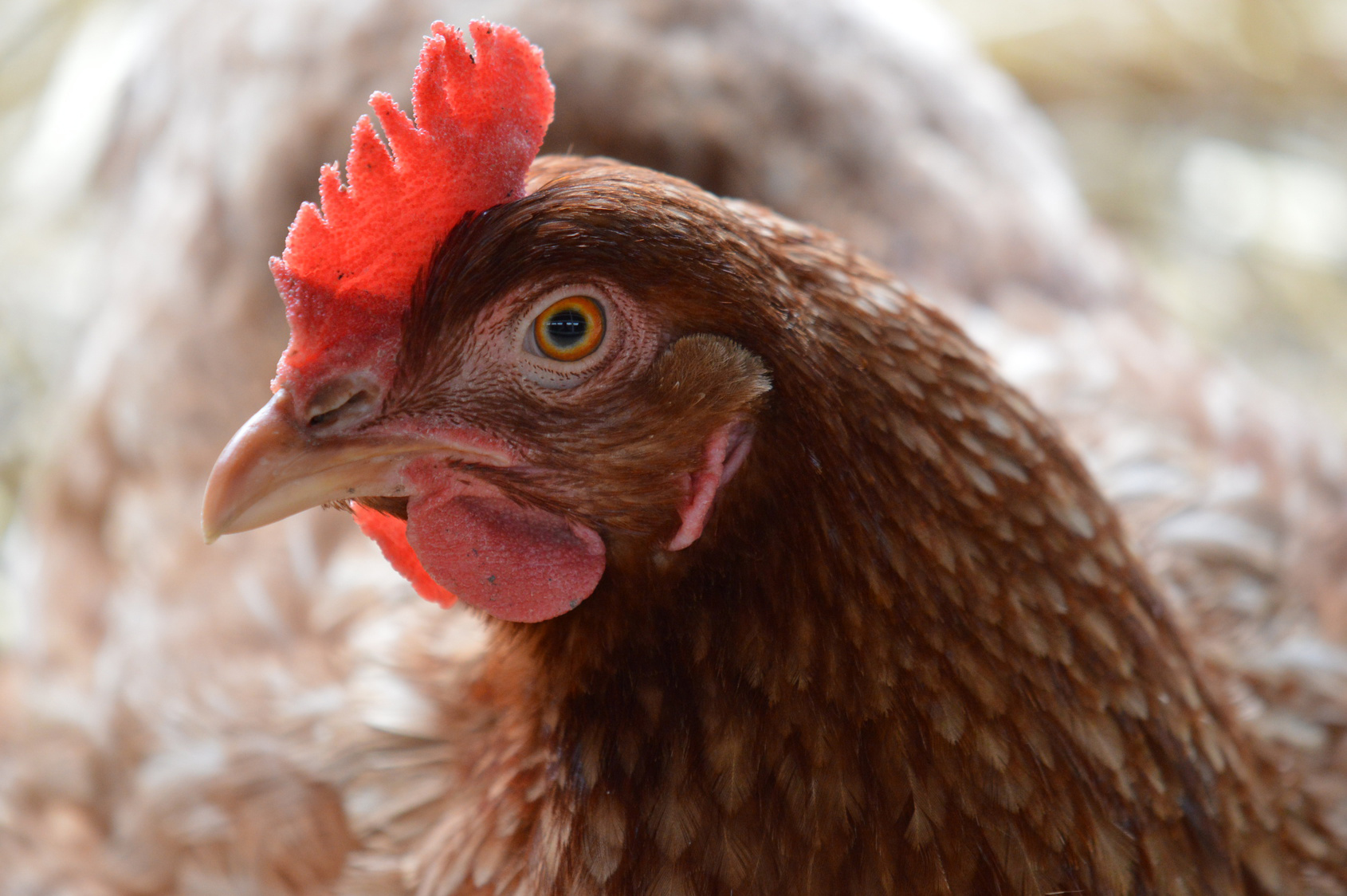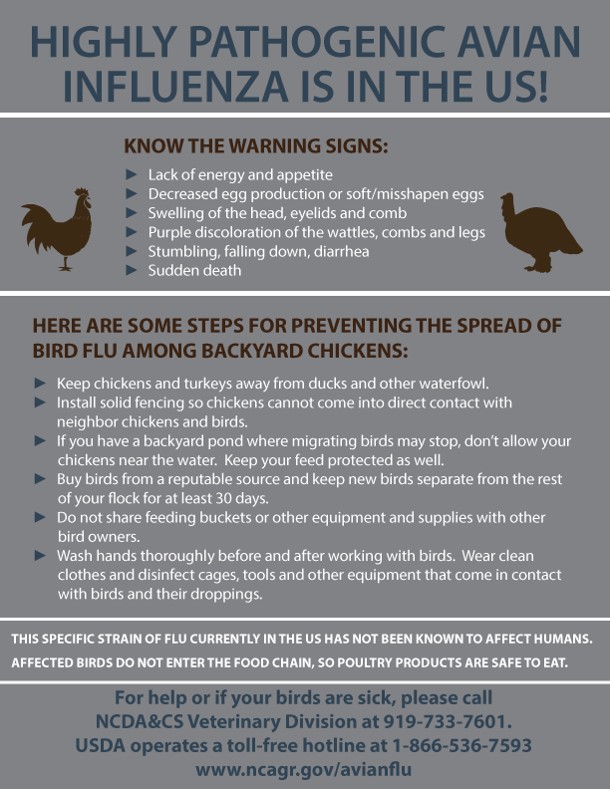Avian Influenza: Know the Facts

[section_subtitle]What is avian influenza? [/section_subtitle]
Avian influenza (AI) is caused by an influenza type A virus which can infect poultry (such as chickens, turkeys, pheasants, quail, domestic ducks, geese and guinea fowl) and is carried by free flying waterfowl such as ducks, geese and shorebirds. There is currently an outbreak of highly pathogenic avian influenza circulating in the United States that is very dangerous for your flock. This infection has been shown to be carried by wild migratory waterfowl.
[section_subtitle]Can I get avian influenza from eating poultry or eggs?[/section_subtitle]
- AI is not transmissible by eating poultry or eggs that have been properly prepared. The chance of infected poultry or eggs entering the food chain is extremely low because of the rapid onset of symptoms in poultry as well as the safeguards in place, which include testing of flocks, and federal inspection programs.
- Hens infected with HPAI usually stop laying eggs as one of the first signs of illness, and the few eggs that are laid by infected hens generally would not get through egg washing and grading because the shells are weak and misshapen. In addition, the flow of eggs from a facility is stopped at the first suspicion of an outbreak of HPAI without waiting for a confirmed diagnosis. Therefore, eggs in the marketplace are unlikely to be contaminated with HPAI.
- Cooking poultry, eggs and other poultry products to the proper temperature and preventing cross-contamination between raw and cooked food is the key to safety. You should follow the same handling practices that are recommended to prevent illness from common food-borne pathogens such as Salmonella. For more information on the safety of handling eggs see: http://www.fda.gov/Food/FoodborneIllnessContaminants/BuyStoreServeSafeFood/ucm077342.htm
[section_subtitle]How to protect your backyard flock[/section_subtitle]
Cleaning and Disinfecting Checklist for Backyard Poultry Owners:
- Protecting your birds from disease has always been important. However, taking biosecurity to the next level is now more crucial than ever. As we work together to prevent HPAI and add strength to North Carolina ’s poultry industry, there are small steps you can take that will have a big impact.
- Eliminate opportunities for your birds to interact with wild birds. We know that wild waterfowl are carriers of disease, including HPAI. The best way to avoid diseases that wildlife carry is to keep domestic animals separated from the wild.
- If you have birds at home, do not visit another farm, home or facility that also has birds. If you must visit another premises, be sure to shower and put on clean clothes and shoes beforehand.
- Remember that vehicles can be vehicles for disease transmission. Before you drive down the road, consider where you are going. Will you be heading to the fair, another farm or a live bird market? If the answer is yes, be sure your vehicle is clean and free of dirt, manure and other organic material.
- Early detection can help prevent the spread of disease. Knowing the signs to look for and monitoring the health of your birds on a regular basis is very important. Signs include nasal discharge, unusually quiet birds, decreased food and water consumption, drop in egg production, and increased/unusual death loss in your flock.
- Report sick and dead birds to state health officials immediately. If your birds appear sick or you have experienced increased mortality, contact the Office of the State Veterinarian immediately at 919-707-3250. All persons practicing veterinary medicine in North Carolina shall report the following diseases and conditions to the state veterinarian’s office by telephone within two hours after the disease is reasonably suspected to exist.
- More details available at: https://www.aphis.usda.gov/publications/animal_health/2015/hcard_checklist.pdf
[cvm_video id=”UqL9daem604″] Keep Your Birds Healthy [/cvm_video]
[section_subtitle]Frequently Asked Questions[/section_subtitle]
- I’ve heard that I might catch avian influenza from my flock. Is this something I should be concerned about? The types of avian influenza known to be in the U.S. now have not affected humans. Most human cases of avian influenza have been in the Far East and Middle East. If you are traveling to those areas of the world, you should avoid poultry markets and close contact with live birds or their droppings.
- My ducks and chickens, turkeys and guineas live together and all seem healthy. Do I need to separate them? It is a good idea to keep all waterfowl separate from your chickens, guineas and turkeys. Waterfowl are known carriers of the influenza virus and may appear perfectly healthy, while being able to infect your flock.
- How can I protect my flock from the serious avian influenza that is affecting flocks in the US right now? Since the avian influenza that is present in the U.S. now is carried by wild waterfowl, you can protect your flock by separating waterfowl and their droppings from gallinaceous birds like chickens, turkeys and guineas. Provide shelter for your flock from areas where waterfowl gather, such as ponds or streams. Follow good biosecurity practices with your flock such as using dedicated shoes and clothing to care for them, and avoid contact with other flocks or with waterfowl in public areas.
- My flock lives outside except when they enter their coop for the night. Should I keep them inside all the time? Moving flocks inside will provide further protection because they have less chance of coming in contact with wild waterfowl. If you cannot keep them in housing, be sure to avoid anything that might attract other birds, such as feeding them in the open.
- How could wild waterfowl give the disease to my flock? Wild waterfowl typically shed the virus through their droppings. The virus lives well in cool, moist places, so access to ponds and streams can be dangerous for your flock. It is best to keep your flock confined so that they cannot access areas where waterfowl gather.
- Any materials to help backyard flock owners recognize symptoms of HPAI? Both https://www.aphis.usda.gov/publications/animal_health/2015/pos_backyard_bio_six_ways.pdf and http://www.ncagr.gov/avianflu offer valuable information.
[section_subtitle]Information resources:[/section_subtitle]
The N.C. Department of Agriculture and Consumer Services is requiring all poultry owners, regardless of the number of birds, to register with NC Farm ID. This will facilitate the department in alerting poultry owners about an outbreak, especially owners in close proximity to a positive farm. Anyone already part of the National Poultry Improvement Plan is exempt from this requirement. The State Veterinarian is given authority to implement any emergency measures necessary to prevent and control an imminent animal disease. Information gathered through registration will be used solely for animal health purposes and is confidential. This critical data will provide animal health officials with necessary contact information in case of an animal health concern, and help identify animals and premises that may have been affected.
- CDC http://www.cdc.gov/flu/avianflu/h5/
- USDA http://www.usda.gov/wps/portal/usda/usdahome?contentid=avian_influenza.html
- USDA H5N2 national chart http://1.usa.gov/1gkAFwD
[section_subtitle]NC Poultry Statistics[/section_subtitle]
- BROILERS (chickens raised for meat) are the top ag commodity in the state, representing more than $2.8 billion in cash receipts in 2012. 795 million broilers were raised in North Carolina in 2013.
- North Carolina ranks No. 3 in the nation in poultry and egg cash receipts.
- C.’s poultry industry is worth more than $4.1 billion in cash receipts alone.
- TURKEYS In 2013 N.C. growers raised 28.5 million turkeys, worth more than $848 million. North Carolina is the third largest turkey producing state in the nation.
- EGGS In 2013, the N.C. egg industry contributed more than $392 million to the state’s economy. More than 13 million layers produced more than 1.8 billion eggs.



